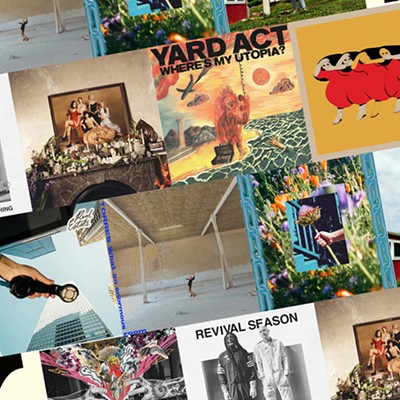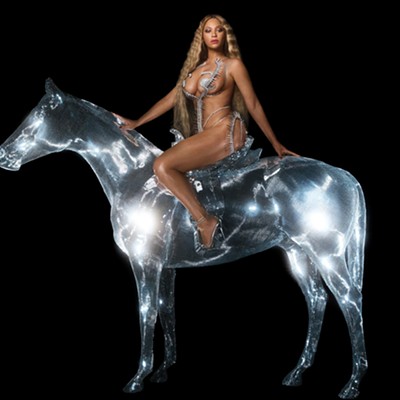by Leah Sottile and Mike Corrigan
If you don't have a DJ, then you can't be a hip-hop posse. Kind of like if you don't have a standard lead guitar-bass-drum line-up, you can't be a real rock group. If you don't have hair gel, you can't be n & uuml;-metal. Your lead singer's voice is too high? You just might get labeled as emo. No cowboy hat, Confederate flag or gun rack -- well, you just ain't country.
It's almost as if every musical act must project certain physical, mental and musical requirements before die-hard fans of any genre can shell out the money for their CD. And that's exactly where the Roots, arguably one of the most innovative and talented musical acts to grace stages, music stores and home stereos in the last 10 years, ran into their main problem.
They've got two MCs. They've got a guy on bass. They've got a drummer, a keyboardist and a guy who can mimic any noise -- with his mouth. That's it. They're a "hip-hop band" -- not a posse or entourage or gang. Any music they make is by their own talent -- and they can replicate it all during a live show. Sure, they don't have those mainstream elements, but they are hip-hop to their very core. There's no DJ. There's no scratching, no sampling or mainstream hip-hop masquerading. They are a musical group that (gasp!) is making music.
But because those elements that have become essential to the ears of mainstream hip-hop listeners are missing from the Roots' music, the group has never been totally snatched up by the greater hip-hop community.
People are clearly not listening.
It was 1987 when Tariq Trotter (Black Thought) and Ahmir Khalib Thompson (?uestlove -- or Questlove) first crossed paths at the Philadelphia High School for Creative Performing Arts. They were just kids -- and they couldn't scrape up enough allowance money between them to buy any hip-hop essentials: some turntables, a mike and crates of vinyl. But Quest had a drum kit, and Black Thought had some things to say -- so they made music relying on their own skills.
The two started playing on the streets of Philly; Quest kept the time while Black Thought attracted crowds by rhyming about the shoes and shirts of those passing by. It was in the street performing biz that the two met up with another MC (Malik B.) and a talented bass player (Hub). The four got together, created jazzy hip-hop tunes and started playing in clubs around Philly and New York City. They found a huge following there in the underground scene -- but didn't drop an album into the mainstream until 1995.
Their first mainstream album, Do You Want More?!!!??!, was shelved in hip-hop sections. From the first track, Malik B. tells listeners that they are about to "witness some organic hip-hop jazz." Seems cheesy -- but it's a fitting characterization. The album spoke common images of geysering Philly fire hydrants, crumpled packs of cigarettes and barely-there summer breezes. It was so much more than hip-hop -- Do You blended hip-hop essentials into jazz and funk and rock as if they'd mastered the art long ago. Lines were blurred, styles were blended and, perhaps it was because of those undefined boundaries, the album never made much of a dent in the pockets of hip-hop fans.
That's not to say they didn't enjoy success. The Roots traveled to the Swiss Montreux Jazz Festival -- touring with a number of guest acts. After the trip, the quartet became a sextet, adding the talent of keyboardist Kamal and human beatbox, Rahzel the Godfather of Noyze. The group took the stage at Lollapalooza in 1995, and started to see most of their devoted following coming from alt-rock fans. They became known for their stunning live shows -- but never saw an album peak any higher than No. 21 on the charts.
They've released four more records since their 1995 debut, and they tour no less than 250 nights per year. They've collaborated with hip-hop authorities from Mos Def, Talib Kweli and Jurassic 5, to Common and A Tribe Called Quest. Though never a band with top-40 radio hits, they're a group that has demanded the respect of the hip-hop, jazz and alternative fans everywhere by truly relying on the music's underlying roots -- something that few other groups can claim.
Women About to Rock -- AC/DC is a rock band almost universally hated by mothers, critics and Bible thumpers, but generally adored by just about everyone for whom rock 'n' roll is more than just a pastime but a matter of life or death. The thunderous Aussie quintet first hit these shores in 1976 (with High Voltage) and never looked back, going on to forge an amazingly successful career out of a very basic rock formula that consisted of sucker-punch riffs, primordial beats, snarling vocals and lyrical subject matter that rarely strayed from sex and partying -- except when it was an ode to brawling. Thus AC/DC was just what the kids of the day were howling for: a stripped-down, no-BS powerhouse act that came at a time when American rock was in desperate need of a jump-start.
It's no wonder that there are, to this day, rock fiends out there who do their best to emulate the band, either on the sly or more overtly. Into that latter category fall Hell's Belles, billed (since forming in 2000) as the world's premier all-female AC/DC tribute band. Local rock fans will get a chance to salute the band and its AC/DC road show tonight at Mootsy's.
Beefing up the assertion that Hell's Belles are, in fact, the baddest AC/DC tribute act in the land is AC/DC mastermind and lead guitar-wielder, Angus Young himself, who (in a recent Blender Magazine article) fully endorsed the band.
Though Hell's Belles are devoted to faithfully reproducing and hellaciously rocking the bejeezus out of AC/DC's explosive catalog (High Voltage through Highway to Hell, Back in Black and beyond), the group members bring much of their own personality, style and passion to each performance. Founding member and front woman Om Johari convincingly pulls off both the Bon Scott and the Brian Wilson vocals without blowing her voice box. Dread-locked Adrian Conner leads the cherry red Gibson SG guitar attack dressed in a female version (plaid skirt, white shirt and tie) of Angus Young's familiar English schoolboy attire. The squad is held into place by the rock-solid rhythms of Lisa Brisbois (on rhythm guitar), Mandy Reed (on bass) and Melodie Zapada (on drums).
Hell's Belles represent something more, too -- namely, the empowerment of women in rock, a tipping of the gender scales back to something approaching equality. Few fans who experience the band's AC/DC love fest live come away with anything less than an appreciation for the way the Belles -- not as women but as rockers, first and foremost -- pull it off.
Are you about to rock? I'd say you are.
Drifting Into Town -- This spring -- and all through the summer as well -- there's going to be a lot more hot action at the Northern Quest Casino in Airway Heights than the usual poker, craps and slots. With the casino's Big Band Series and Legends of Rock-N-Roll concerts, music is the name of the game. Already, savvy big band aficionados have made the short trek out west of Spokane to catch the Jimmy Dorsey Orchestra, the Spinners and the Gene Krupa Orchestra.
This weekend, take in some vintage R & amp;B, soul, pop and rock 'n' roll with the Drifters -- or more accurately, the Elsbeary Hobbs Drifters -- with the Marvelettes at the Northern Quest on Saturday night.
Confused? Rightfully so. But then, the lineup of the aptly named Drifters hasn't exactly been stable these many years. Even in the early days, there was considerable confusion over the fact that there were in essence two groups on the same label (Atlantic) known as the Drifters.
Ex-Dominoes tenor Clyde McPhatter assembled the first version of the Drifters after he was signed to the then-brand new Atlantic Records in 1953. Yet from the beginning, the group was more a creature of its producers (notably, Atlantic big wig Jerry Wexler) than of any single, or indeed collection, of members. When McPhatter left the group a year later to pursue a solo career, the last remnant of group autonomy evaporated and the Drifters descended into a revolving-door lineup situation where members came and went as salaried musicians who earned chump change for their efforts, received no royalties and were barred from using the group name on their own should they ever leave.
One of the more popular versions of the Drifters was the one featuring Ben E. King on baritone. This incarnation (a completely new lineup replacing one that was fired) is known for producing some of the group's most memorable hits, including "There Goes My Baby," "This Magic Moment" and "Save the Last Dance for Me." The Drifters' hit parade continued (with different singers, of course) into the mid '60s with "Up on the Roof," "On Broadway" and "Under the Boardwalk."
The version of the group performing this Saturday night was assembled by Odessa Hobbs, widow of the late Elsbeary Hobbs, bass singer of the group through much of its late-'50s-to-late-'60s chart-topping heyday. Hobbs led a reconstituted Drifters lineup into the '80s and '90s until his death in 1996.
Future events in the Northern Quest concert series include dates with the Royal Swing Orchestra (with its tribute to Benny Goodman on June 5), Beatlemania (June 12), Herman's Hermits with Peter Noone (July 10), the Glenn Miller Orchestra (July 28-29) and Guy Lombardo's Royal Canadians with the Al Pierson Orchestra (Aug. 5). Things switch hard to rock with Mitch Ryder & amp; the Detroit Wheels (Aug. 21), followed by JANA (Aug. 28) and the Divas of Rock-N-Roll show with the Shirelles, the Crystals and Kathy Young and the Innocents (Sept. 25).
Publication date: 05/20/04
Digging Deep
[
{
"name": "Broadstreet - Instory",
"insertPoint": "5",
"component": "25846487",
"requiredCountToDisplay": "5"
},{
"name": "Broadstreet - Instory",
"insertPoint": "10",
"component": "25846487",
"requiredCountToDisplay": "10"
},{
"name": "Broadstreet - Instory",
"insertPoint": "15",
"component": "25846487",
"requiredCountToDisplay": "15"
},{
"name": "Broadstreet - Instory",
"insertPoint": "20",
"component": "25846487",
"requiredCountToDisplay": "20"
}
]














